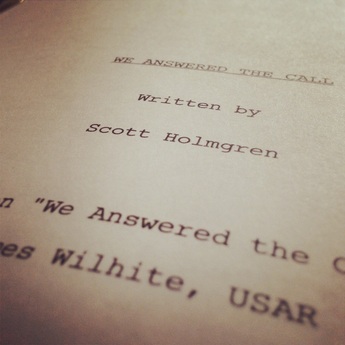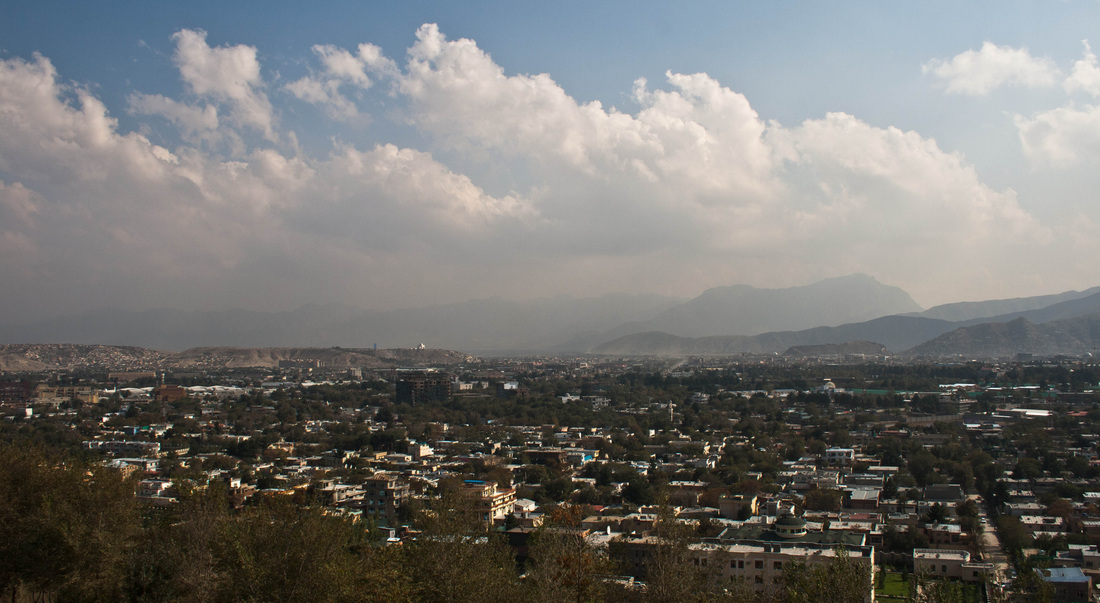|
Scott Holmgren ::
I was convinced the story of We Answered the Call needed to be told. Colonel James Wilhite’s story of building an academy of higher learning and military training based on the West Point model – in Afghanistan! – had captured my imagination. Not only did it play out in a war zone where media-filtered accounts and sometimes misportrayals of what was going on spun a one-dimensional rendering, but it was also a fiercely personal journey of a man pursuing his life’s purpose against the forces that opposed him. It was a story both unlikely and unnerving but original and inspirational. Harrowing yet heroic. But could it be told as a movie? What potential was there for producing a feature-length screenplay? In discussing the project with Jim, we both agreed that the building blocks for a narrative film were there. The main protagonist had a clear and strong objective with numerous, escalating roadblocks in his way. There were also several subplots that could be included to support and accentuate Jim’s main story. Jim’s character also underwent change as he had to overcome obstacles that were both situational and interpersonal. Lastly, there was a clear resolution to the main story arc. However, there would also be several challenges in adapting the story. First, there are lots and lots of characters. Lots. Besides Jim and his wife Emily, the supporting personnel comprising Jim’s team who rotated in and out of the mission were numerous. Several people were permanent fixtures at OMC-A. Throw in all the Afghan officers, governmental leaders, translators and one very disconnected NATO officer, and we had a cast of named characters numbering over seventy-five. Like I said, lots. How many would be too many for an audience to follow? Second, there was no clear antagonist. George Bailey has Mr. Potter. Maximus has Commodus. Luke Skywalker has Darth Vader. But Jim had no direct opponent. Now certainly many great films have the hero of the story working against forces and situations without one face. In Saving Private Ryan, Captain John Miller must overcome the German army to find and evacuate Private Ryan. In Black Hawk Down, the American forces are battling the army of the Mogadishu warlord. But these stories rely heavily on dramatic action to propel the situation forward. How would Jim's story flow without a main antagonist? Third, stretches of the book contained lengthy information or exposition. These passages would need to be either set aside or woven into the story progression. How would we handle them? Finally, there were several problems that were solved "off screen" in the book. In real life, the building of the academy was very much a team effort. Many of the named characters did things and made decisions that kept the opening of the academy moving forward. But often there were just mentions of these solutions without descriptions or Jim's direct involvement. Could we integrate these situations? Knowing these challenges we set about to adapt the book into a screenplay. With Jim advising, I finished a first draft, 120 pages, as faithful and close to his book's narrative as it could be. And then we needed some objectivity. We were both so close to the story, it was difficult to know what was working and what wasn't. As far as I knew, I had just completed either the next Casablanca or the next Battlefield Earth. A producer I know suggested a script reader, and off we sent the script to L.A. to be read and returned with some professional analysis.
1 Comment
Scott Holmgren :: I met Colonel James Wilhite a few years back. He was the guest speaker at our local West Point Parents Club's annual "Hail & Farewell" Luncheon. My son had graduated high school and was gearing up for R-Day and Cadet Basic Training - Beast Barracks - as an incoming Cadet Candidate at the Unites States Military Academy at West Point. "Hail & Farewell" is when the parents club celebrates the newly commissioned Second Lieutenants that have just graduated from the Academy who live in the area and congratulates the local high school graduates who will shortly embark on their journey to West Point. Jim had been invited to share his experiences in Afghanistan. Like most Americans, my perspective on our military's involvement was limited to news sound bites and internet headlines with an occasional article tossed in from time to time. National support would waffle, but ultimately it was sliding towards an unpopular war. And now my son was heading into the proving ground for our country's future military leaders. As a parent, I could not help begin to wonder, "what has he gotten himself into?" But then Jim began to speak. What I heard was not a gloom and doom lament over misguided strategies, not a condemnation of an administration's actions, not a verdict on the wisdom or lack thereof to get involved in a land war in Asia. No. It was a story I had never heard. And one I almost didn't believe was true if it were not for the tenacious gentleman from Oklahoma who bared his spirit and narrated an amazing account of overcoming impossible odds and vehement opposition to a mission that ultimately fell on his shoulders. He had been tasked to build a national military academy for Afghanistan that was modeled on West Point. And he had no budget and no full-time staff. Not even a wizard's staff would have been much help. As I listened to his account - how he was ordered to active duty in his late fifties while teaching at a local university, how his wife stared straight through him in disbelief when he told her the news, how he arrived in the shadows of the Hindu Kush with no specific orders and dependent on translators for vital communications - I kept asking myself, "Why have I not heard about this?" It was an amazing story of ingenuity, perseverance, humility, compassion, determination, and selflessness that buoyed my perspective on not only Afghanistan but also our military's role in projecting freedom and democracy to the world. Afterwards, I bought a copy of his book and thanked him for sharing his story. As I shook his hand, there was a pull on my spirit as well... How could more people hear this story? Kabul, Afghanistan in 2011.
|
AuthorsColonel James Wilhite Archives
December 2017
Categories
All
|


 RSS Feed
RSS Feed